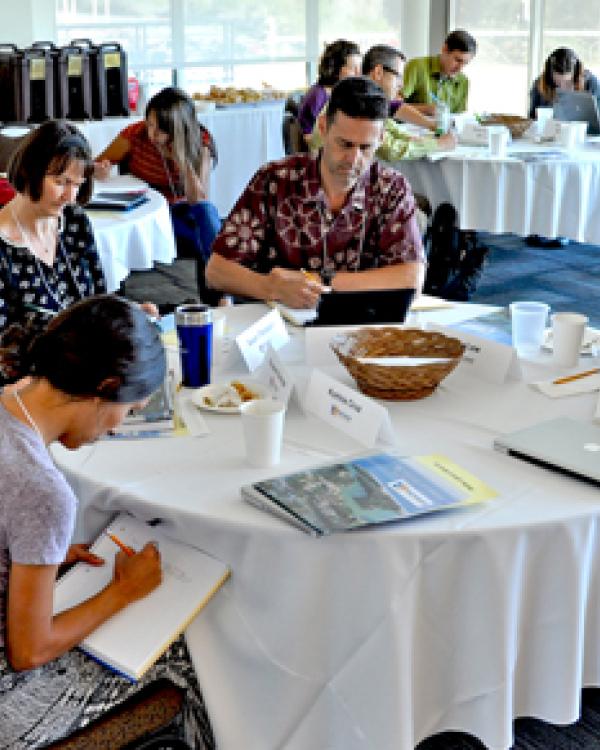
Area teachers were writing the first day as part of the Pathway Project
It’s 8:30 on a Tuesday morning, and 31 area junior high and high school teachers are playing hooky. That’s because they are on campus at UC Santa Barbara, taking part in the kickoff of the Pathway Project, a professional development program that will make them better teachers of academic reading and writing, especially for students who are English Language Learners (ELL).
Tim Dewar--the Single Subject Teaching Credential Coordinator for the Teacher Education Program and Director of the South Coast Writing Project (SCWriP) housed in the Gevirtz Graduate School of Education at UC Santa Barbara--welcomes the group by saying, “We get to spend the next two years together to talk about teaching. Just think of the number of lessons we’ve taught in this room.”
Drawing on all the best practices from the group is just one part of the plan. The first presenter of the day, Dovas Zaunius, currently working as a teacher on special assignment (TOSA) to assist Santa Barbara Unified School District (SBUSD) secondary teachers transition to the new Common Core State Standards, stresses, “We’re going to lead with the research,” kicking off an activity that gets the room up and moving, discussing and considering quotes from articles peppered with phrases like “pedagogy and practice” and “cognitive approaches.” Pathways to Academic Success will give these teachers a luxury they don’t often get during their busy workdays – the opportunity to delve deep in the latest research on teaching and learning, then bring that knowledge back to their classrooms.
The ambitious project is funded by a four-year grant from the U.S. Department of Education’s i3 (Investing in Innovation Fund), with a total award of $1.48 million. The grant is for four writing project sites, UC Irvine, CSU Los Angeles, CSU San Marcos, and UC Santa Barbara. The full title is The Pathway to Academic Success: A Cognitive Strategies Approach to Text-Based Analytical Writing to Improve Academic Outcomes for Secondary English Learners.
“I’m really excited about it,” says Dewar, the PI for the grant. “In the course of the two years teachers will receive 96 professional development hours; our Teacher Education Program candidates in a year of focused language arts instruction don’t get that much. It’s that intense.” Dewar also stresses how this work is particularly valuable now, claiming, “The academic reading and writing expected under the new Common Core standards demands more of all students. Those who have a tool kit of cognitive strategies for making meaning, like these teachers will learn how to develop, will be able to meet the higher bar.”
“I am excited that our teachers are part of such an important project,” says David Cash, Superintendent of the Santa Barbara Unified School District. “Working to improve the academic performance of our English Learner students is one of the most important projects our staff can engage in and having UCSB’s SCWriP as a partner insures that the work will produce positive results for our students.”